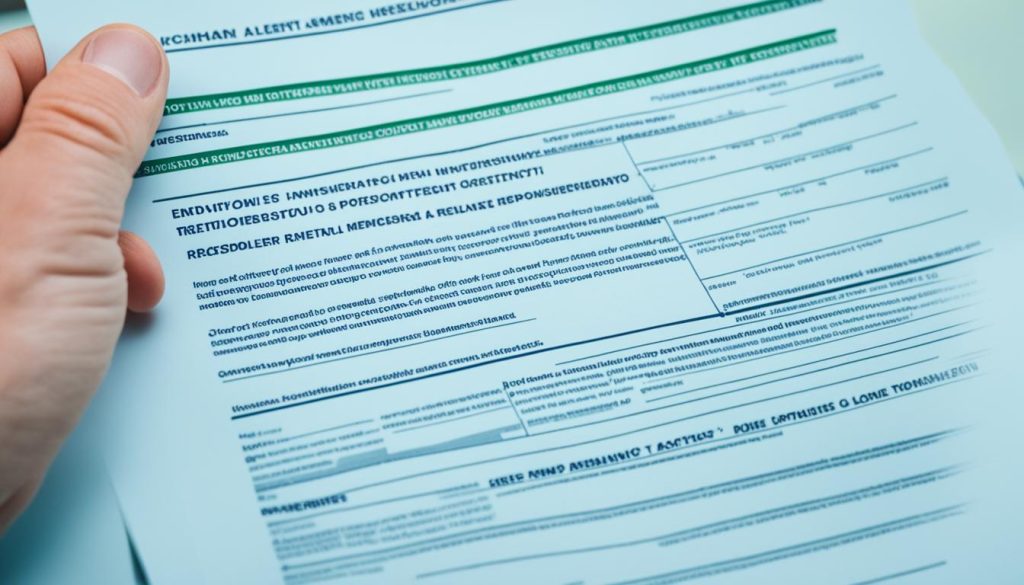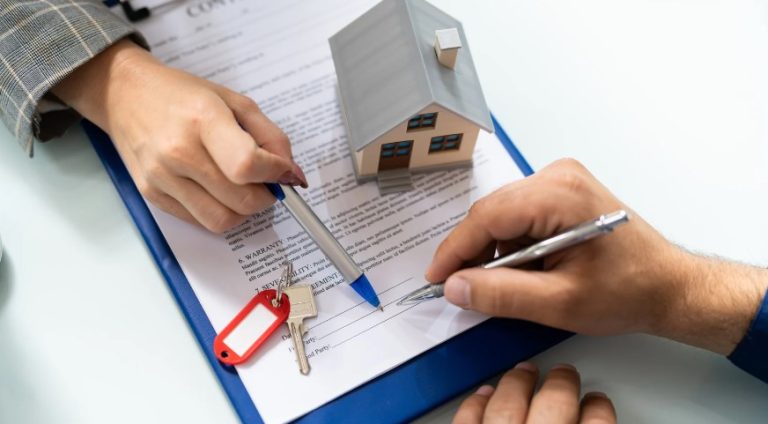In England’s lively rental market, a massive 4.5 million households rent their homes. This shows how crucial it is to know about renting. The government has provided the key ‘How to Rent’ guide. It includes lots of info and laws, helping you step by step in renting.
This guide is like a map for anyone looking to rent. It offers advice and rules to ensure a smooth rental journey.
The How to Rent guide is more than just rules for tenants. It’s a must-know for both people renting and those letting properties. It talks about everyone’s rights and duties. So, it helps keep things fair between landlords and tenants.
What’s great is, the guide is easy to understand. There’s a special version for people who might find it hard to read. Keeping up with the guide’s updates is key. This way, you always know the latest rules for renting. It’s your starting point for a good and informed rental experience.
Understanding Your Tenancy Rights and Responsibilities
Leasing in the UK means knowing your rights and the laws that cover them. The ‘How to Rent’ document is key for tenants and landlords to follow the rules. It helps avoid problems and keeps your home secure.
This guide explains what both landlords and tenants should do, promoting a good relationship. It talks about the tenancy agreement, renting advice, and where to find help if needed.

The ‘How to Rent’ guide also highlights the new Housing Loss Prevention Advice Service (HLPAS). It helps tenants through tough times, like when they could lose their home. This service supports on many issues, such as dealing with the rent or living conditions.
| Aspect | Detail | Page on ‘How to Rent’ Guide |
|---|---|---|
| Tenancy Agreements | Essential terms and conditions every tenant and landlord should understand | 5 |
| Landlord Responsibilities | Legal obligations, including repair and safety rules | 8 |
| Tenant Rights | Includes right to live undisturbed, security, and requesting repairs | 12 |
| Housing Loss Prevention Advice Service (HLPAS) | Legal advice on repossession, rent arrears, and lodging conditions | 15, 17 |
Knowing these guide sections can make both tenants and landlords feel more sure. It helps things work better during a rent period, whether you’re starting or continuing a lease. For more help and advice on renting, checking the full ‘How to Rent’ guide is a great idea.
How to Rent Guide: Starting Your Journey to a New Little
Starting your rental journey can be thrilling yet worrying. For a smooth ride, you need clear advice and a good tenant guide. We offer a handy renting checklist, advice on keeping your deposit safe, and tips on making a strong rental agreement.
Preparing Essential Documentation
Before looking for a place, have your documents ready. You’ll need ID, proof of money like bank statements, and past landlords’ details. These show landlords you’re reliable.
Navigating Deposit Caps and Protections
Knowing about deposit rules is key for tenants. Your deposit won’t be more than five or six weeks’ rent. Make sure your money is in a protected scheme for peace of mind if there are issues later.
Finding Accommodation Through Accredited Channels
Choosing where to rent matters. Go for landlords or agents who are part of respected groups. This means they meet certain standards and care about your rights.

| Feature | Importance | Beneficial Strategies |
|---|---|---|
| Valid Documentation | Essential for verification | Prepare documents early, keep digital copies. |
| Deposit Protection | Secures your deposit against unfair deductions | Verify landlord’s adherence to deposit schemes. |
| Accredited Letting Channels | Reduces risk of scams and ensures professionalism | Choose agents or landlords with verified accreditations. |
Selecting the Ideal Rental Property
When you start looking for a place to rent, it’s crucial to think about key factors. These factors can really change how you feel about where you live. Finding the right rental combines what you need with what you can afford. This makes sure you’re happy during your stay.
It’s smart to make a list of things you must check. This list should include how much the rent is, what rights you have as a renter, how safe the place is, and if it meets living condition laws.
- Rental cost should not exceed 35% of your take-home pay, which helps in maintaining a budget without compromising other financial obligations.
- Verify eligibility for any housing benefits that could alleviate the monthly financial burden.
- Inspect the property for safety installations like smoke alarms and carbon monoxide detectors which are mandatory compliance as per the Homes (Fitness for Human Habitation) Act 2018.
- Check the lease for rules about pets or smoking. Make sure these rules work for you.
It’s key to know who pays for what, especially utility bills. Agreeing on this and checking the home’s safety features is very important.
| Consideration | Details | Advice |
|---|---|---|
| Tenancy Deposit | Cap and protection details according to the legislation | Ensure deposit is stored in a tenancy deposit scheme |
| Affordability | Not more than 35% of take-home pay | Calculate budget prior to rental property search |
| Safety Features | Smoke alarms, carbon monoxide detectors installed | Check functionality during property inspection |
| Living Conditions | Compliance with Homes Act 2018 | Review property’s fitness for human habitation |
Before you sign anything, make sure you understand how long you can stay and what you can and can’t do at the property. Finding a place that meets your needs will make your search easier. It ensures your new home is everything you hoped for.
Living in Your Rental Home
Starting your life in a rented home means knowing your duties and rights. Renting is more than just paying the owner. You have to keep the place tidy and know how you’re protected.
Maintenance and Repairs: Tenant and Landlord Duties
Tenants and landlords both have jobs when it comes to upkeep. Tenants keep things clean and tell the landlord if something’s broken. Landlords make sure the place is safe. They must fix big problems fast, like if the heat stops working. Always keep a record of any issues you report.
Rent Guarantor: Understanding Its Significance
Having a rent guarantor is crucial, especially if you’re a student or have an unsteady job. They promise to pay the rent if you couldn’t. This helps tenants keep their homes and gives peace of mind to the owner, so it’s very important.
Dealing with Issues: Accessing Housing Loss Prevention Advice Service
When there’s a problem, help is available. The Housing Loss Prevention Advice Service assists tenants in tough spots. They help with issues like eviction or bad living conditions. These services defend your rights, which is essential advice for renters.
Understanding your rights is crucial when you rent a place. It protects both you and the landlord during your stay.

| Maintenance Responsibility | Tenant | Landlord |
|---|---|---|
| Minor Repairs | Yes | No |
| Major Repairs | No | Yes |
| Property Cleanliness | Yes | No |
| Safety Checks | No | Yes |
| Appliance Maintenance | No | Yes |
Conclusion
Starting the renting process can seem tough, but the ‘How to Rent’ guide is here to help. It’s a top guide for anyone beginning to rent, providing all the info tenants need. It talks about what’s in your lease, roles, and rights when renting in England. No matter if you’re new to renting or you’ve rented before, it’s a must-read. It covers everything, from choosing a place to what to do when you’re living there.
This guide boosts renters’ confidence in the housing market. It gives advice to avoid problems and shows why it’s key to follow the law. It’s a friend for anyone looking for safe housing, helping to make sure that both renters and landlords play fair. Being clear and following the rules makes renting better for everyone.
In short, the ‘How to Rent’ guide helps landlords and tenants have a good, legal renting experience. By following its tips, everyone can enjoy a peaceful rental, where respect and clear rules are the norm. This guide is crucial for a smooth rental path, full of knowledge and readiness.
FAQ
What documents do I need to prepare before renting?
Before renting, you should have documents to prove who you are and your finances. Bring your photo ID, bank statements, references, and proof of income.
What fees are landlords and letting agents banned from charging?
In England since June 2019, you can’t be charged for certain things. This includes viewing properties and setting up tenancies. Some costs are still allowed, like rent and a deposit.
What maintenance and repair responsibilities do tenants have?
Tenants should do small maintenance jobs like changing lightbulbs and keeping the place tidy. Tell the landlord about big problems.
What is a rent guarantor, and when might I need one?
A rent guarantor is someone who agrees to pay if you can’t. Landlords might ask for one if they think there’s a big risk. This could be due to being a student or low income.
How can the Housing Loss Prevention Advice Service help me?
This service gives legal advice for those about to lose their home. It also helps with bad housing situations. It can offer support with many rental problems.
Are there any restrictions on the amount landlords can charge for a tenancy deposit?
Yes, there are limits on how much can be charged for a deposit. It can’t be more than five weeks’ rent if the annual rent is under £50,000. If the rent is £50,000 or more, the maximum deposit is six weeks’ worth. This rule stops deposits from being too high compared to rent costs.






